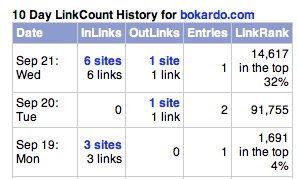September 24th
Google Testing 2 New Services
(via tech.memeorandum) Google is testing two new services that promise to change what we do on the web (again).
One is personalized search history. If you have a Gmail account, sign in and on your Google home page (http://www.google.com/ig) you can find your Google Search History in the top right nav bar, at this address (http://www.google.com/searchhistory/).
Personalized Search History is important for privacy issues. We’ll trust Google more if we know what information they’re keeping about us. Folks are are getting leary about what Google knows and what they would potentially use it for. This is a great way to increase transparency and alleviate public fear. And who knows, if they provide RSS feeds for this…someone will come up with some really cool way to aggregate it.
The second is a way to provide feedback about search results. They’re testing a new feature designed for giving feedback when you get spam in your search results. Presumably, over time Google would be able to offer a better search by gathering this sort of feedback from users.
Search Feedback is huge because it’s including users in the filtering (architecture of participation). In addition to giving page links weight, this would be a more community-involved way to refine search results. Just yesterday I wrote how I think filtering is incredibly important right now. I think this feature is the tip of the iceberg.
This is incredibly big news! I can’t wait to see where it goes from here…
